【TPO小站】托福听力的6种题型精解
托福考试听力部分题型分析
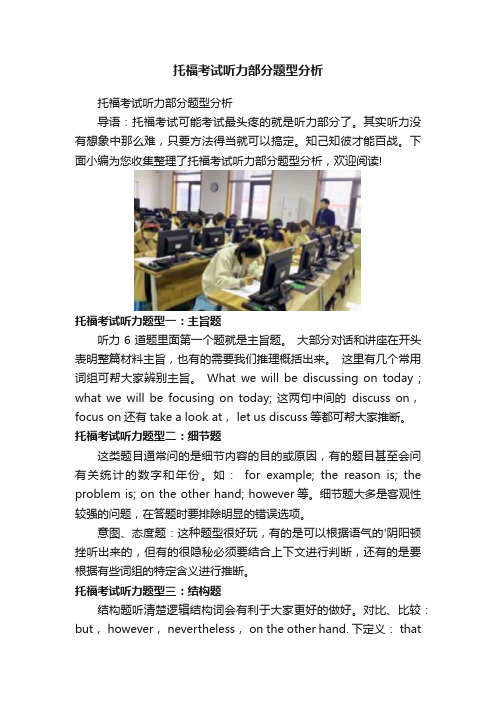
托福考试听力部分题型分析托福考试听力部分题型分析导语:托福考试可能考试最头疼的就是听力部分了。
其实听力没有想象中那么难,只要方法得当就可以搞定。
知己知彼才能百战。
下面小编为您收集整理了托福考试听力部分题型分析,欢迎阅读!托福考试听力题型一:主旨题听力6道题里面第一个题就是主旨题。
大部分对话和讲座在开头表明整篇材料主旨,也有的需要我们推理概括出来。
这里有几个常用词组可帮大家辨别主旨。
What we will be discussing on today ; what we will be focusing on today; 这两句中间的discuss on,focus on还有take a look at, let us discuss等都可帮大家推断。
托福考试听力题型二:细节题这类题目通常问的是细节内容的目的或原因,有的题目甚至会问有关统计的数字和年份。
如:for example; the reason is; the problem is; on the other hand; however等。
细节题大多是客观性较强的问题,在答题时要排除明显的错误选项。
意图、态度题:这种题型很好玩,有的是可以根据语气的'阴阳顿挫听出来的,但有的很隐秘必须要结合上下文进行判断,还有的是要根据有些词组的特定含义进行推断。
托福考试听力题型三:结构题结构题听清楚逻辑结构词会有利于大家更好的做好。
对比、比较:but, however, nevertheless, on the other hand. 下定义: thatis, which is,which means, in other words. 因果: due to,since, therefore, so. 分层次: first, next, then, after that,lastly等。
大家不要盲目听,要带着目的去注意这些小词。
托福考试听力题型四:排序题本人认为,排序题结合了细节题以及结构题,所以这种类型的题目很难把握。
托福听力题型十大解析

托福听力题型十大解析在托福听力考试中,对于题型的把握非常重要;它对于理解句子的正确意思起着致命的作用;下面托福频道给大家做进一步解析。
1) BUT题型。
这类题型在托福题中层出不穷,根本每一套托福题中都会有三、四、五道不等,这类题型解题关键是努力听懂but 后面的东西,因为这个地方永远是考点。
对一般考生而言,让他将所有的东西都听出来不大可能,因为实力不够。
但假设是让他听出其中的一点,那就没什么问题。
而but 恰恰就是这样一个标志,听见but就该使劲了,一使劲问题也就解决了。
试看几例:a) Does this music bother your studying, Pam?Actually I’m not studying any more, but I’m trying to sleep. ( 年1月第23题) b) Gee, Tom, I hear that you are working as a house painter this summer. It’s got to be awfully hot working up there on a ladder in the blazing sun all day.Well, it’s hard work, but I get to be outdoors and the pay is decent. ( 年1月第9题)c) I don’t think I want to live in the dormitory next year. I need more privacy.I know what you mean. But check out the cost of renting an apartment first, I wouldn’t be surprised if you changed your mind. ( 年1月第30题)2) 对一般疑问句答复题型。
托福听力的六大题型

托福听力的六大题型一主旨题(theme)Main point/ what does the passage mainly discuss?答题技巧:如果是对话类文章,在前5个句子之内出现答案,有的甚至在第一句出现答案; 如果是讲座型,考查的是听力材料的总体内容, 注重结构,选择的是主要内容目的主旨题(Gist-Purpose)答题技巧:在听时,要关注对话中主题;在听Campus conversation时,学生常试图解决一个问题,理解学生的问题所在及其解决办法将有助于回答二细节题(Detail)答题技巧:记笔记笔记应该包括Campus conversation或者Academic lecture中的重要细节,同时预测题目读题干,通过选项适当排除返回笔记,找到题目在笔记中对应的位置返回题目当中,根据笔记中的内容和文章主旨作答三语音语调题(Phonetics and Intonation)答题技巧:要根据上下文,在记笔记时要重点注意问句和感叹句,理解清楚特殊语气所表达的情绪,质疑,愤怒,懊恼,感谢,坚持。
说话人态度题( Understanding the Speaker’s Attitude)听力要点:学会关注说话人的语气(说话人听起来是愧疚的、困惑的、还是充满热情的),说话人的语气可以帮助考生回答此类问题小提示:说话人的字面意思可能与其真实意图不符四句子功能题( function or purpose)考察关联能力,要求考生将材料中的信息相互联系起来,作出整合、推论,以及得出结论、归纳总结、进行预测( Connecting Information Question)五组织结构题(Understanding Organization)答题技巧:按照类别分类如生物题,分为捕食,寄生,共生,每一类的例子顺序题如制作陶器加热,打碎,混合,冷却等按听到的关键词排序比较题如某一个动物属于哪一个专有名词的案例六推论题(Making Inference)答题技巧:考生是否能利用文章中出现的细节做出结论基于教授在听力部分所提及的某些事实。
【TPO小站】托福听力完全自学讲义_非常详细

新托福强化听力讲义新托福考试听力部分介绍1.新托福和旧托福的对比考试形式预读题目笔记题型PBT旧托福Paper Yes No 1/4 multiple choiceIBT新托福Internet No Yes New types2.题量,时间,分数文章类型题量题目数时间CONVERSATION 2-3 5 / conversation 2-3 min /conversation LECTURE 4-6 6 / lecture 4-6 min / lecture TOTAL 6-9(加试)34 60-90 min SCALE SCORE: 30 见OG185评分标准3.题目的考查形式➢考场环境:独立电脑,耳机,铅笔,草稿本➢电脑环境:图片,视频,声音,板书➢新题型:双选题,重听题,表格配对题➢答题时间:总时间限制,每题分配时间不限➢答题流程:永不悔改4.文章材料的考查形式➢文章结构:删除了旧托福的PART A 部分,更加注重于对于能力的考查➢文章长度:比旧托福长➢文章语速:无所谓快慢,比旧托福更加贴近真实的学习生活➢文章类型:对话,独白,讨论CONVERSATION文章思路LECTURE文章思路5.新托福考试题型概述IBT listening comprehensionBasiccomprehensionGist questionDetail questionPragmaticunderstandingPurpose questionAttitude questionConnectinginformationOrganization questionInference question题号问题题型1Why does the student go to see theprofessor?Gist question2 According to the professor, whatinformation should the student include inher statement of purpose?Detail Question3What does the professor consider unusualabout the student’s background?Detail Question 4 Why does the professor tell a story about Detail Questionhis friend who went ot medical school?5 What does the professor imply about thepeople who admit students to graduateschool?Inference question6 What are the students mainly discussing? Gist question7 Listen again and then answer thequestion:Why does the woman say this?Purpose question8 According to the conversation, why aretransposes sometimes called “jumpinggenes”?Detail Question9 According to the conversation, what are twoways in which bacteria cells get resistancegenes?Detail Question10What can be inferred about the resistancegenes discussed in the conversation?Inference question11 What is the talk mainly about? Gist question12What is the professor’s point of viewconcerning the method of “safe yield”?Detail Question 13 According to the professor, what are two Detail Questionproblems associated with removing wter from an underground system?14 Listen again and then answer thequestion:Why does the professor say this?Purpose question15What is a key feature of a sustainable watersystem?Detail Question16 What does the professor imply about watersystems managed by the “safe yield”method?Inference question17Why does the professor talk about Plato’sdescription of society?Gist question18 Listen again and then answer thequestion:Why does the professor imply aboutplato’s ethical theory?Attitude question19 Listen again and then answer thequestion:Why does the professor ask this?Purpose question20 What are two points that reflect Plato’s Detail Questionviews about education?21 Based on information in the lecture, indicatewhether the statements below abouthuman emotion reflect beliefs held by Plato,Organizationquestion22According to Plato, what is the maincharacteristic of a good or just person?Detail Question23 What is the main topic of the lecture? Gist question24According to the professor, why did onescientist grow a rye plant in water?Detail Question25 Listen again and then answer thequestion:Why does the professor say this?Purpose question26 The professor mentions houseplants thatreceive too much water. Why does shemention them?Detail Question27 Listen again and then answer thequestion:Why does the professor intend to explain?Purpose question28According to the professor, what similarity isthere between crabgrass and rye plants?Detail Question29 What is the lecture mainly about? Gist question30 Why does the professor talk about aconstruction company that has work indifferent cities?Detail Question31 Listen again and then answer thequestion:Why does the professor say this?Purpose question32What is an example of a violation of the“unity of command” principle?Detail Question33 According to the professor, where mightthere be a conflict in an organizationalstructure based on both projects andfunction?Detail Question34 Indicate whether each sentence belowdescribes functional organization or project organization. Place a check mark in thecorrect box.Organizationquestion➢Gist question: 6➢Detail question: 16➢Purpose question: 6➢Attitude question: 1➢Organization question: 2➢Inference question: 3 6.界面展示7.IBT新托福资料说明——听力部分图片资料名称特点推荐使用方法The Official Study Guide ●题目数量不多●难度较简单●题型全面,和考试相同,质量高●精听精做●题目分类研究●文章精读研究●不建议模考ETS TOEFL PRACTICE ONLINE ●一共14套,其中新东方引进4套,还有2套是OG题目,其他全部为全真试题●难度和考试相当,已经有较全的版本出现●题型全面,场景全面●精听精做●建议最后冲刺模考DELTA 新托福考试备考策略与模拟试题●题目数量大,后面有四套模拟试题●前面的训练题目文章较短,不是托福模拟●精听精做●建议考前强化训练●对语速跟读●听力材料要比考试稍难些,速度也稍快些●题型和考试相差很多,不建议细钻模仿DELTA 新托福考试模拟试题●题目数量大,有六套模拟试题●具体特点同蓝皮delta●建议考前模拟●对语速跟读模仿BARRON 新托福考试全真模考题与精解●题目数量大,后面有7套模拟试题●难度偏小,在基础班使用●建议平时精听训练KAPLAN模考试题四套●有四套模拟试题●听力部分略难,语速略快●配合模拟光盘,有临考感觉●考前模考THOMSON模考试题两套●只有两套题,但质量很好,文章难度适中,题目难度和Barron相近,感觉上略难一些,和考试非●建议模考常相似。
托福听力态度题解析
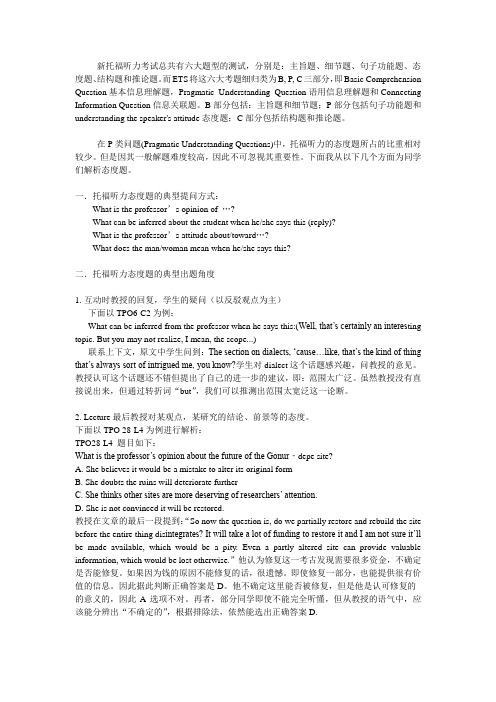
新托福听力考试总共有六大题型的测试,分别是:主旨题、细节题、句子功能题、态度题、结构题和推论题。
而ETS将这六大考题细归类为B, P, C三部分,即Basic Comprehension Question基本信息理解题,Pragmatic Understanding Question语用信息理解题和Connecting Information Question信息关联题。
B部分包括:主旨题和细节题;P部分包括句子功能题和understanding the speaker's attitude态度题;C部分包括结构题和推论题。
在P类问题(Pragmatic Understanding Questions)中,托福听力的态度题所占的比重相对较少。
但是因其一般解题难度较高,因此不可忽视其重要性。
下面我从以下几个方面为同学们解析态度题。
一.托福听力态度题的典型提问方式:What is the professor’s opinion of …?What can be inferred about the student when he/she says this (reply)?What is the professor’s attitude about/toward…?What does the man/woman mean when he/she says this?二.托福听力态度题的典型出题角度1.互动时教授的回复,学生的疑问(以反驳观点为主)下面以TPO6-C2为例:What can be inferred from the professor when he says this:(Well, that’s certainly an interes ting topic. But you may not realize, I mean, the scope...)联系上下文,原文中学生问到:The section on dialects, ‘cause…like, that’s the kind of thing that’s always sort of intrigued me, you know?学生对dialect这个话题感兴趣,问教授的意见。
【TPO小站】TOEFL口语考试六道题答题要点回顾
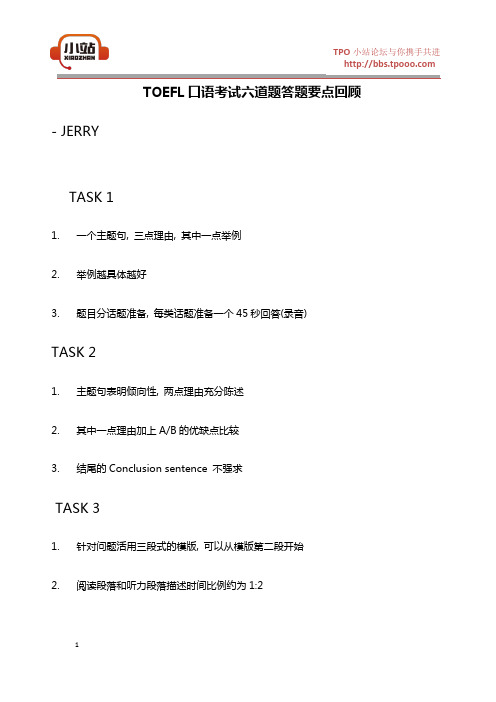
TOEFL口语考试六道题答题要点回顾- JERRYTASK 11. 一个主题句, 三点理由, 其中一点举例2. 举例越具体越好3. 题目分话题准备, 每类话题准备一个45秒回答(录音) TASK 21. 主题句表明倾向性, 两点理由充分陈述2. 其中一点理由加上A/B的优缺点比较3. 结尾的Conclusion sentence 不强求TASK 31. 针对问题活用三段式的模版, 可以从模版第二段开始2. 阅读段落和听力段落描述时间比例约为1:23. 半数问题可能只针对听力段落提问, 回答可不提阅读段落TASK 41. 用两三句话概括阅读段落大意, 重点在听力段落描述2. 阅读段落中有提到, 但没有在听力段落中提到的信息, 答题时可以不说3. 半数问题可能只针对听力段落提问, 回答可不提阅读段落, 引用概念即可 TASK 51. 前半部分问题的描述尽量使用模版, 节约时间2. 前半部分陈述问题+描述方案时做到条理清晰, 描述准确3. 描述个人倾向意见时不强求两条理由, 一条充分描述即可TASK 61. 描述清楚起因,结果和主要特征最重要2. 两个例子或试验分别进行描述, 说完一个再说另一个3. 尽量不要遗漏重要信息, 同时注意不要张冠李戴1. 描述人物:1) What are the characteristics of a good friend? Use reasons and examples tosupport your responses.答题要点: 重要的是描述出2-3个优点, 并加上举例.类似题目:*What are the characteristics of a goodneighbor/parent/teacher/classmate/roommate?* Describe the characteristics that make a person successful2) Which person has helped you the most to get where you are today, and howhas he or she helped you?答题要点: 重要的是描述出2-3件事情, 越具体越好类似题目:* What person who is alive today would you most like to meet?* Describe a person you admire most and explain why you admire this person? * What famous person would you like to visit for one hour and why?* Describe a person who has influenced you in an important way. Explain why this person has had an effect on your life.2. 描述地点:Describe a place where you go for rest and relaxation. Explain why it is a good place for you to relax.答题要点: 描述出3点左右的理由, 如beautiful scenery, shopping facilities, employment opportunities, easy transportation …类似题目:* If you could live anywhere, where would you live?* Which place in your hometown would you like to take visitors to see and why? * Choose a place you go to often that is important to you and explain why it is important.* What foreign country would you like to visit? Choose a country and explain why you would like to go there.* Describe one thing you would like to improve about your hometown.3. 描述节日What is your favorite holiday? Use reasons and details to support your response.答题要点: 描述出喜欢的理由, 如relax, travel, family reunion, get-together …类似题目:* What is your favorite day of the year?* Describe an event such as a holiday or other occasion that you enjoy celebrating and explain why the event is significant to you,4. 描述工作If you can have any job in the world, what would it be?答题要点: 从几条类似理由中找出容易的描述点,如: Challenging job, decent salary, social status, good reputation, chances for promotions, travel …类似题目:What would be your dream job?5. 描述事件:What event in your life made you very happy?答题要点: 通过具体例子描述出这件事情的重要性, 可选择描述大学录取, 获得重要奖励, 难忘旅行等, 同时要考虑如果题目让你描述不好的事情时怎么说类似题目:* Describe the most impressive event in your life.* What important lesson have you learned in your life?6. 描述体育运动:What is your favorite game? Describe the game and explain why you like to play it.答题要点: 万能理由五选一: Exercise, relax, make friends, make money, team work, team spirit类似题目:* What is your favorite sport?* What new skill would you like to learn?* What do you do in your spare time?* Explain what you do to relieve stress and why you do it.7. 描述食物What is your favorite food?答题要点: 从几条类似理由中选择描述: Delicious, nutritious, not expensive, easy to get/prepare, different choices…8. 描述物品:Describe an object that is very special in your life答题要点: 为什么特殊, 可以选择描述生日礼物, 考入大学/大学毕业的奖品, 重要荣誉/奖品等9. 描述学习* Why you are preparing to take TOEFL?* What do you like/dislike most about learning English?10. 描述人生规划What would you like to be professionally in ten years? Use details to support your responses.其它值得准备的题目:* What is your favorite book?* What is your favorite movie?新TOEFL口语考试第二题练习精选- Jerry 整理(仅供参考)校园生活(学习类话题)1. Do you prefer to take essay exams or multiple-choice exams?2. Do you prefer to take essay exams or oral presentations?3. Would you prefer to take the TOEFL test or a math test?4. Would you prefer to write a paper by yourself or with a group?5. Sometimes students have to write paper. Sometimes they have to give oralpresentations. Which activity do you think is better for students and why?Includes details and examples in your explanation6. Some people prefer to study a little in many subjects, while others prefer to studya single subject in depth. Which do you prefer and why?7. Some students study for classes individually. Others study in groups. Whichmethod of studying do you think is better for students and why?8. In some schools, teachers decide what classes students must take. Other schoolsallow students to select their own classes. Which system do you think is better and why?9. If your teacher makes a mistake, is it better to correct the teacher or ignore themistake?10. Do you prefer to be in a large class or a small class?校园生活(非学习类话题)1. Some people get up early in the morning and go to bed early at night. Others getup late in the morning and stay up until late at night. Which do you think isbetter and why?2. Some people prefer to live in the city, and some people prefer to live in thecountry, which do you prefer and why?3. Some students like to live off campus, like rent an apartment to live in; whileothers prefer living on campus, like stay in the dormitories. Which would you prefer and why?4. Some people prefer to plan their own trips, while other people prefer to travel onplaned tours. Which do you prefer and why?5. Some people take one long vacation each year. Others take several shortvacations. Which do you prefer and why?6. Some people like going to large parties where there are many people they do notknow. Other people prefer small parties with a few close friends. Which type of party do you prefer and why?7. Some people like going to concerts to hear music played live. Others preferlistening to recorded music. Which musical experience do you think is better and why?8. Some people drive their own car to school or work. Others ride a bus, a train, orother form of public transportation. Which do you think is better and why?9. Some people get most of their news from the radio or television. Others read thenewspaper. Which source of news do you think is better and why?10. Some people keep in touch with friends and family members by letter or e-mail.Others keep in touch by telephone. Which method do you prefer to use and why?11. Do you prefer to go out to dinner or stay home and cook a meal?12. Would you prefer to take a trip by plane or by train?其它较难话题:1.Is it better to take chances in life or play it safe?2. Do you make decisions quickly or take your time making them?3. Do you think it is better to tell the truth and hurt someone’s feelings or tell alittle lie to keep from hurting the person?4. Do you agree or disagree with the following statement. All the effects oftechnology have been positive.5. Do you agree or disagree with the following statement. Having a lot of money isvery important.6. Some college students choose to take courses in a variety of subject areas in orderto get a broad education. Others choose to focus on a single subject area in order to have a deeper understanding of that area. Which approach to course selection do you think is better for student and why?7. Some people like going after fashion. Other people don’t. Which do youprefer and why? Include details and examples in your explanation.your family or a career that does not pay so much but allows you time with yourfamily?。
托福听力考试常见题型及解题方法
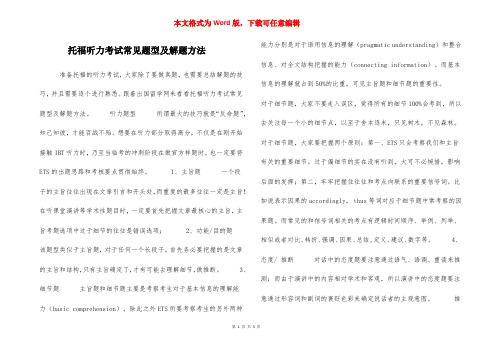
托福听力考试常见题型及解题方法准备托福的听力考试,大家除了要做真题,也需要总结解题的技巧,并且需要逐个进行熟悉。
跟着出国留学网来看看托福听力考试常见题型及解题方法。
听力题型所谓最大的技巧就是“反命题”,知己知彼,才能百战不殆。
想要在听力部分取得高分,不仅是在刚开始接触IBT听力时,乃至当临考的冲刺阶段在做官方样题时,也一定要将ETS的出题思路和考核要点贯彻始终。
1、主旨题一个段子的主旨往往出现在文章引言和开头处,而重复的最多往往一定是主旨!在听课堂演讲等学术性题目时,一定要首先把握文章最核心的主旨,主旨考题选项中过于细节的往往是错误选项;2、功能/目的题该题型类似于主旨题,对于任何一个长段子,首先务必要把握的是文章的主旨和结构,只有主旨确定了,才有可能去理解细节,做推断。
3、细节题主旨题和细节题主要是考察考生对于基本信息的理解能力(basic comprehension),除此之外ETS所要考察考生的另外两种能力分别是对于语用信息的理解(pragmatic understanding)和整合信息、对全文结构把握的能力(connecting information)。
而基本信息的理解就占到50%的比重,可见主旨题和细节题的重要性。
对于细节题,大家不要走入误区,觉得所有的细节100%会考到,所以去关注每一个小的细节点,以至于舍本逐末,只见树木,不见森林。
对于细节题,大家要把握两个原则:第一、ETS只会考察我们和主旨有关的重要细节。
过于偏细节的实在没有听到,大可不必惋惜,影响后面的发挥;第二,牢牢把握住往往和考点向联系的重要信号词。
比如说表示因果的accordingly, thus等词对应于细节题中常考察的因果题。
而常见的和信号词相关的考点有逻辑时间顺序、举例、列举、相似或者对比、转折、强调、因果、总结、定义、建议、数字等。
4、态度/ 推断对话中的态度题要注意通过语气、语调、重读来推测;而由于演讲中的内容相对学术和客观,所以演讲中的态度题要注意通过形容词和副词的褒贬色彩来确定说话者的主观意图。
托福听力考试的题型和解题方法
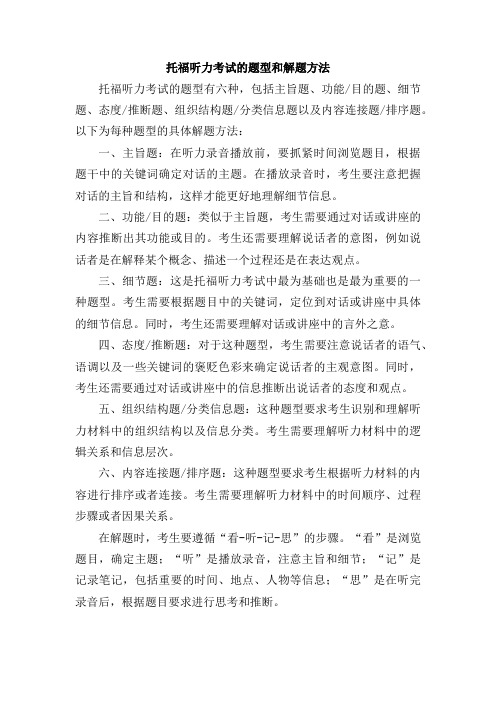
托福听力考试的题型和解题方法
托福听力考试的题型有六种,包括主旨题、功能/目的题、细节题、态度/推断题、组织结构题/分类信息题以及内容连接题/排序题。
以下为每种题型的具体解题方法:
一、主旨题:在听力录音播放前,要抓紧时间浏览题目,根据题干中的关键词确定对话的主题。
在播放录音时,考生要注意把握对话的主旨和结构,这样才能更好地理解细节信息。
二、功能/目的题:类似于主旨题,考生需要通过对话或讲座的内容推断出其功能或目的。
考生还需要理解说话者的意图,例如说话者是在解释某个概念、描述一个过程还是在表达观点。
三、细节题:这是托福听力考试中最为基础也是最为重要的一种题型。
考生需要根据题目中的关键词,定位到对话或讲座中具体的细节信息。
同时,考生还需要理解对话或讲座中的言外之意。
四、态度/推断题:对于这种题型,考生需要注意说话者的语气、语调以及一些关键词的褒贬色彩来确定说话者的主观意图。
同时,考生还需要通过对话或讲座中的信息推断出说话者的态度和观点。
五、组织结构题/分类信息题:这种题型要求考生识别和理解听力材料中的组织结构以及信息分类。
考生需要理解听力材料中的逻辑关系和信息层次。
六、内容连接题/排序题:这种题型要求考生根据听力材料的内容进行排序或者连接。
考生需要理解听力材料中的时间顺序、过程步骤或者因果关系。
在解题时,考生要遵循“看-听-记-思”的步骤。
“看”是浏览题目,确定主题;“听”是播放录音,注意主旨和细节;“记”是记录笔记,包括重要的时间、地点、人物等信息;“思”是在听完录音后,根据题目要求进行思考和推断。
- 1、下载文档前请自行甄别文档内容的完整性,平台不提供额外的编辑、内容补充、找答案等附加服务。
- 2、"仅部分预览"的文档,不可在线预览部分如存在完整性等问题,可反馈申请退款(可完整预览的文档不适用该条件!)。
- 3、如文档侵犯您的权益,请联系客服反馈,我们会尽快为您处理(人工客服工作时间:9:00-18:30)。
托福听力的6种题型精解1:GIST QUESTION 主旨目的题➢ 什么是主旨目的题?主旨题分为内容主旨和目的主旨托福听力题型 主旨题 功能题 结构题 细节题 推理题态度题➢如何识别主旨目的题?What are the students mainly discussing?What is the main topic of the talk?What is the lecture mainly about?What is the talk mainly about?What is the main purpose of the lecture?What is the professor mainly discussing?➢文章的主旨解决之道:(1)听准开头;(2)把握对话目的;(3)对于演讲,敏感开头句型;(4)捕捉全文重复(主题决定细节,细节反映主题);(5)训练关键词的敏感(大多是名词和动词)——适应于长对话➢文章的主旨展开方式(1)直接展开:●today we are going to talk about…●I’d like to begin my lecture by introducing…●let’s focus on…●let’s now take a look at…(2)问答式展开:●how are companies typically structured?●Do you remember what they are?●How can you understand it?●Why does human being consider it important?(3)全文关键词总结➢选项特征●正确选项标志词:history, development, background, information,growth, origin, features, characteristics, invention, creation,innovation, evolution, era, trend, comparison, classification等●干扰选项特征:Too general: an idea that is beyond the focus of the conversationor lecturetoo specific: a supporting detail instead of a main ideainaccurate: not true, or only partially true, according to thespeakersirrelevant: about something that the speakers don’t mention2:DETAIL QUESTION细节题➢什么是细节题?require the listener to understand and remember explicitdetails or facts that are important as an explanation or an example of the main idea. These details are typically related, directly or indirectly, to the gist of the text, by providing elaboration, examples or other support.➢如何识别细节题?What problem does the man have? ETSAccording to the conversation, what are two ways in which bacteria cells get resistance genes?Why does the professor talk about Plato’s description of society?➢细节题的考查点(1)时间细节●年份、月份、星期、四季的说法●注意细节对应的事件(2)地点细节●国家名称(缩写、中文)●美国地名(3)名词细节●文章中出现的一个名词前后的特点●记住名词出现时候的发音(4)方位细节●注意方位词的说法●注意方向词的说法(5)数字细节●注意逗号原则的应用●注意分数,小数,百分数的说法●注意数字修饰的名词(6)颜色形状细节●常见的颜色词汇●常见的形状词汇(7)态度细节●注意点评一个事物所用的形容词●注意正负态度评价(8)人名细节●积累常见名人人名的发音●注意人名的前后一致性(9)双选细节●注意并列的原因、建议、结果、陈述、特点●注意序数词和表示顺序的短语(10)图片细节●常见的会出现图片学科:生物学,植物学,地理学,地质学,气象学●抓住图片中的要素:大小,形状,颜色,方向,方位,特点●笔记中记录下图片3:PURPOSE QUESTION功能题➢什么是功能题?the question type often involves replaying a portion of the listening passage.➢如何识别功能题?What does the professor imply when he says this: (reply)What can be inferred from the professor’s response to the student?What is the purpose of the woman’s r esponse?Why does the student say this?➢托福听力中的常见功能:(1)Explanation: Simply put/ Let’s put in this way/ I think I should/ you mean(2)Conclusion: now to sum/ wrap up my speech(3)Suggestion: you should have done something better(4)Inspiration: come on, you are suppose d to know this…(5)Emphasis: please bear in mind that…/ Rhetorical question(6)Correcting mistake: Excuse me, Actually, Did I say XXX? I meanYYY. Oh, wait a minutes, What am I saying? wait a minute/ Imade a slip of tongue4:ATTITUDE QUESTION态度题➢什么是态度题?you may be asked a question about the speaker’s feelings, likes and dislike s, or reason for anxiety or amusement. Also included in this category are questions about a speaker’s degree of certainty: is the speaker referencing a source or giving a personal opinion? Are the facts presented generally accepted or are they disputed?➢如何识别态度题?What can be inferred about the student?What is the professor’s attitude toward…?What is the professor’s opinion of …?What can be inferred about the student when she says this:What does the woman mean when she says this:态度题的Tips:(1) 语气语调,重读,小词;(2) 把握态度上的肯定还是否定;(3) 喜欢还是厌倦;(4) 有兴趣还是没有兴趣;(5) 满意、不满意还是受挫;➢托福听力中的常见态度:(1)Awful: woops! Uh-uh! Oh, no! Oh, dear! Oh, shoot!(2)Remind: I don’t think you will do/ I was wondering if you will do something/ I don’t imagine if you do…/ youhaven’t done something, have you?(3)Pity: what a shame/ that’s too bad./ I’m sorry to hear that/ tough luck(4)Eulogy: Fabulous=Fab; Magnificent=Magnif;Glamorous=Glam; Excellent; Terrific; Awesome;Amazing; Fantastic; Incredible; Outstanding; Superb;Charming; Good job(5)to the professor:Fascinating; Catching; Instructive;Stimulating Thought-provoking;(6)Surprise: Gee! Jesus! My dear! Boy! Jesus Christ! Man!Oh, my God! Gosh! Oh, my! What! Dear me!(7)Tactful refuse: Sounds great, but/ Sounds like fun, but/ that’s tempting, but/ I wish I could, but/ I’d love to, but/ I’dreally like to, but/ I would (if I could), but/ I meant to, but/ Ihave been meaning to (do something), but/ I should have,but…5:ORGANIZATION QUESTION结构题➢什么是结构题?in understanding organization questions you may be asked about the overall organization of the listening passage, or you may be asked about the relationship between two portions of the listening passage.➢如何识别全文结构题?How is the information in the lecture organized?How does the professor clarify the points he makes about Mexico?➢新托福演讲文章的四种典型结构(1)直线型结构(2)并列结构(3)比较结构(4)对比结构➢如何识别表格题?(1)配对表格题:重要信息对号入座,侧重于考察多个时间、地点、人物、事件的对应/段落中主要论点下的各分支及各分支定义和主要特点(2)判断表格题:侧重于考察哪些信息提到/没提到(注意记录文中列举的主要观点/举例)(3)排序表格题:侧重于考察对过程/步骤地把握6:INFERENCE QUESTION推理题➢什么是推理题?You usually have to reach a conclusion based on facts presented in the listening passage.➢如何识别推理题?What can be inferred about …? ETSWhat does the professor imply about …? ETSWhat will the students do in the summer?➢推理题的解题技巧(1)注意出现的观点性语言:in my opinion, as far as I’m concerned, personally, pay attention, from my point of view (2)注意进度条和结尾段的引申(3)注意首尾段的遥相辉映(4)正确选项经常是文章中没有出现的单词。
